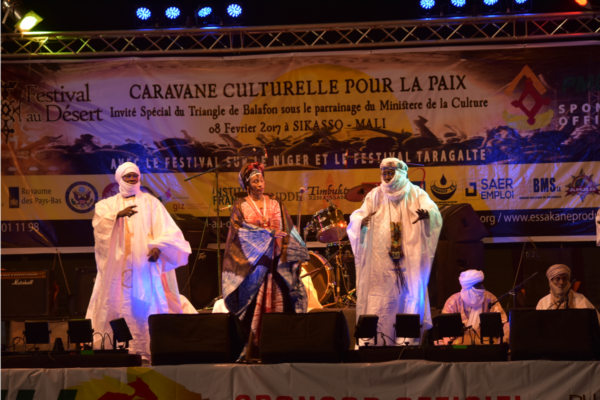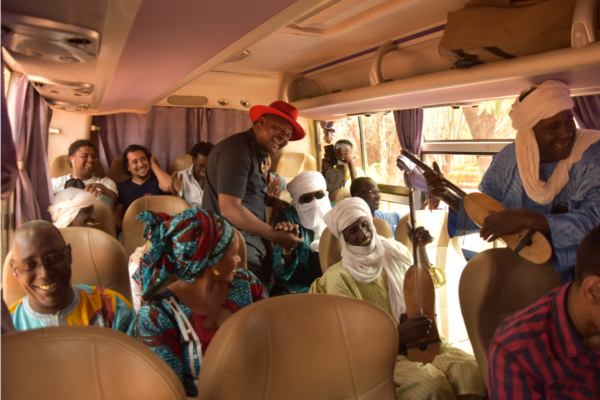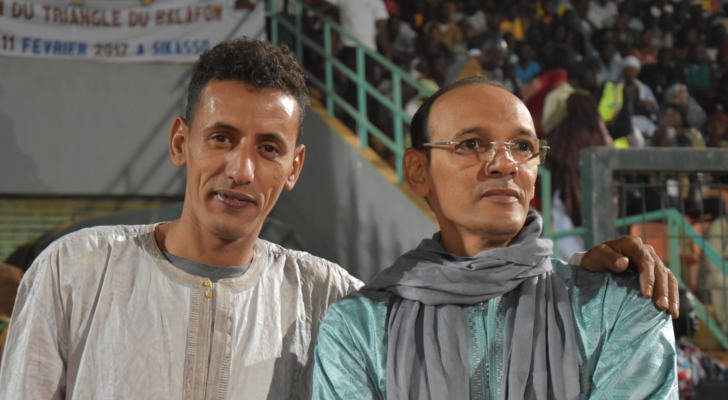Portrait 1: Manny Ansar – Mali
Today, a musical work is travelling around the world – in the name of peace. I would also like to take you on a peace journey to three continents, to three war-torn regions, to three courageous people. Their realities of life could not be more different, but what unites them is the longing to set an example for peace through music. And that also connects them with us, here today.

Manny Ansar
At the beginning of 2017, my second peace report took me to Mali for the Caravane culturelle pour la paix. The “cultural caravan”. What may sound romantic is in reality the result of terror and expulsion: the Tuareg Manny Ansar had co-directed the internationally renowned Festival du Désert for years. In 2012, the festival was attacked by jihadist groups, the stage and instruments were burnt and the organisers’ lives were threatened.

Caravane culturelle pour la paix (culture/peace caravan)
Shaken by his experiences and driven by the fear that Mali’s cultural life could be completely wiped out, Manny returned home from the refugee camp. He began to develop a new cultural format, the cultural caravan. It is a mixture of the old tradition of travelling nomads and today’s reality – the threat of radical armed groups. Musicians from various Malian ethnic groups spend two weeks travelling together in a bus across the country and decide at very short notice where the next concert can take place, where it is safe enough. A kind of pop-up tour to call for peace, cohesion and reconciliation. I wanted to accompany them.

On the bus
This plan turned out to be quite a challenge from day one. In my first newspaper reading, I learn that two of several suicide bombers who had planned an attack on the international conference centre have been caught. In other words, the place where I was planning to attend an event the following day.

I arrived in what they call a “fragile state”. You never know what will happen next. Intimidation, insecurity and social division are the main goals of those who want to destroy the country. For me, this means constantly finding the balance between security and something like trust. I vacillate between the SDC motto: “Don’t take part in any public events and change hotels every two days” and the Tuareg approach, which says: “God decides whether you die, not the jihadists”.

Peace conference
In a country known for car mine attacks, we are travelling in a bus that is never guarded. In areas where music is forbidden, we turn up with musicians and instruments. In places where peace activities are persecuted, we organise a peace conference, wave peace banners and the bands sing songs for peace. There are no security precautions or entrance controls for any of this. The Caravane is a walking target.
Festival Segou
I feel like I’m on a minefield when I’m talking to people. People have experienced too much suffering that could erupt at any moment. Atrocities that I can’t imagine, that I can’t put into words.
Mali challenges me: How do you talk about peace without magnifying violence and pain? What stories can I share with the world without contributing to the normalisation of violence? When is violence a driver of new violence? And when is it a reason to strive for peace?
At the same time, Mali becomes a place of strength for me. I am able to witness how people who have experienced violence and displacement and who are constantly threatened anew are unwavering in their commitment to peace. How they find the strength to reinvent themselves when something cannot be changed, but then stand firm when it comes to their values – their will for peace. And how they fight with inner conviction and outward vigour to ensure that the country can free itself from the clutches of violence – whatever the cost.
Pictures: Lea Suter
